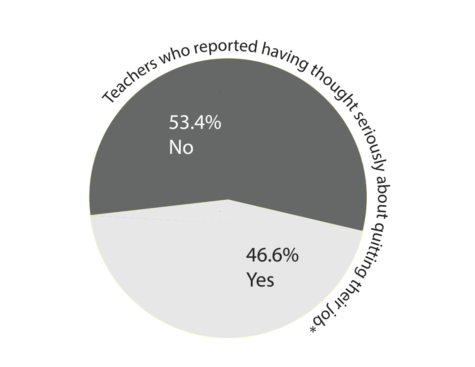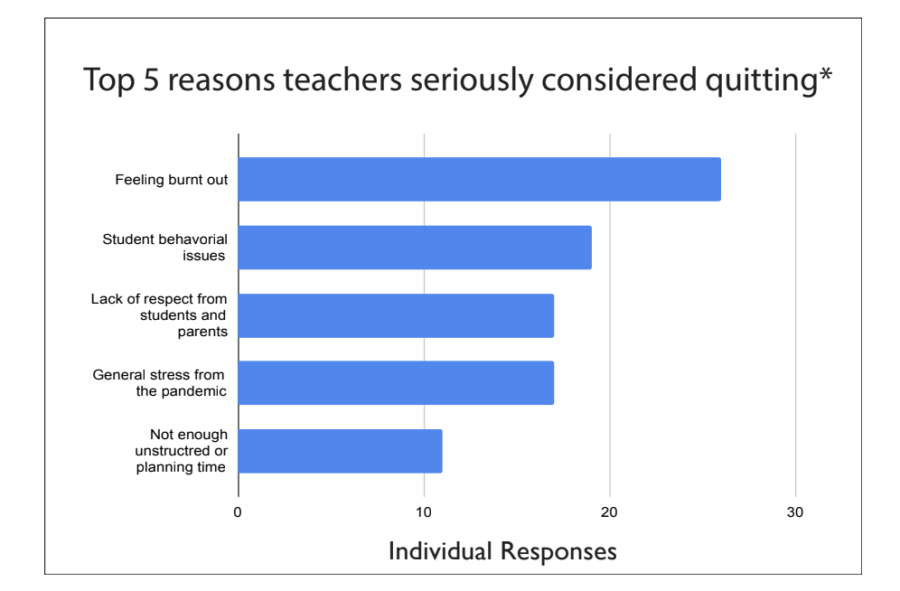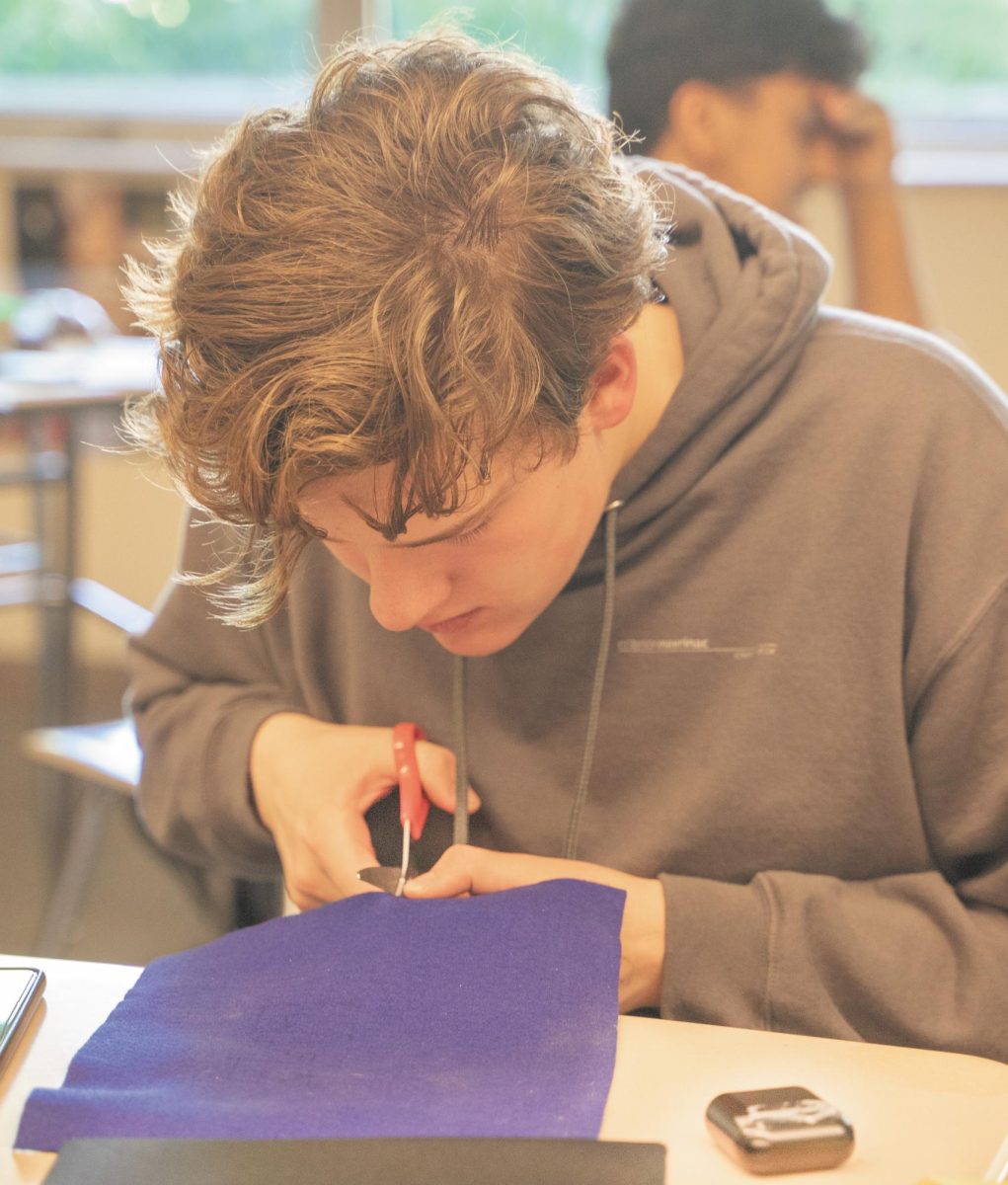
In a recent Nordic News survey of 58 Inglemoor teachers, nearly half stated they had seriously thought about quitting their job since the beginning of the pandemic. Out of the teachers considering leaving the profession, 44.8% of teachers said that they wanted to quit because they felt burnt out.
“I honestly had days last fall when I went home and cried because it’s just too much,” said IB Psychology and Film teacher Katrina Allemeier. “When I compare it to my job five years ago, it’s just not the same—there’s not as much joy in it.”
Allemeier said she knows other teachers that have voiced similar concerns surrounding the increasing demands placed on them. Due to the changes the pandemic has had on a teacher’s job, teaching has become more than simply educating students.
“I used to say before the pandemic and even when we were remote that I couldn’t believe I got paid to do my job because I just found so much joy and energy and love from my job,” said IB English teacher Marita White. “And now I think about quitting every single day.”
After a year of online learning, the pandemic has entirely reshaped the education system. Teachers have noted that masks and the role of technology in human connections are at the core of students losing their ability to understand material and therefore their learning intake.
“Online learning sucked all the joy out of teaching completely because there’s no interaction. You never saw the light bulbs go on—we didn’t get to hear the chatting about a topic,” Allemeier said. “Coming back was like ‘Woohooo!’ But with the masks, it’s so hard to read your audience. We’re not stand up comedians, but we’re reading our audience the whole time. We don’t know if their earbuds are in—we can’t tell what our audience is doing and that’s really tough.”
It’s not uncommon for students in the classroom to be listening to music or to be on their phones while teachers are instructing. Teachers have also noted that Zoom classes exacerbated this problem because students got into the habit of being on their phones during class. According to Allemeier, students have always had distractions in the classroom, but students are now—more than ever—addicted to their phones. This not only creates a toll on students’ education, but also mentally aggravates teachers after having to give repeated warnings to students to refrain from being distracted by their devices.
Overall, White said that throughout her teaching career students have had a good attitude, but this year she struggles to patrol phone use. Additionally, she said before the pandemic, substitutes were easily available for when a teacher took days off. She said this year there have been fewer available, and she has had to spend some of her prep periods subbing for other classes without preparation.
“Probably one of the worst days of my teaching career is when I was told that I had to sub for another class that was all the way across campus. I remember packing up, just sprinting across campus to teach a Spanish class and then running back. I found out I missed my lunch because of it,” said White. “Since then, the sub shortage has gotten slightly better.”
White said that for teachers, taking mental health days is vital, and a lot of times they use their sick leave. She said that since the sub shortage she has heard from colleagues that they can’t get a personal day approved.
“You feel really guilty if you take a day off even if you’re legitimately sick, because you know that one of your colleagues is going to be covering for you, which means losing their planning period, which means probably staying late,” said AP English teacher Marissa Locke.
“I’ve covered for colleagues as well, and even if it feels like it’s just an hour or I know [the class is] going to be independently working, it’s exhausting and it takes a mental toll.”
The demand for skills teachers weren’t originally expecting—like substituting for classes of other subjects and giving mental health support when not professionally trained— has created consistent dissatisfaction among staff.
“This job provides so much support and security, but it doesn’t always keep me driven…we have a shortage of a mental health specialists. Sometimes, I feel like the emotional load is getting to be a little bit heavy,” said school counselor Jessica Parrott.
White believes that taking care of the mental health of teachers starts with taking care of the mental health of students. This year, she said she has seen a huge increase of students in a mental health crisis. Normally, she is concerned about 3-5 students each year, but this year she said she is worried about more than 30 students, which has created a stressful and frantic atmosphere in the classroom. Locke also said that the lack of support for mental health issues has impacted her teaching as well.
“I wish there was more support for teachers and more support for students. Because even though I knew students were really isolated, I felt really isolated too. It was hard for me to support students in their isolation while I felt that I was going through the same thing. I had reached out about getting help, and no one ever emailed me back and I felt disrespected and discouraged,” said Locke. “But, I know it was a complicated situation with how busy and overwhelmed everybody was. So it just felt like, from top to bottom, if you think of things as a hierarchy, who could we go to for help? When I was supposed to be the adult in the situation helping students, I felt really helpless.”
Although the pandemic has brought attention to students’ mental health, Locke said that teachers’ mental health hasn’t garnered any sort of mainstream attention until recently. She said that sometimes she comes to work and feels invisible and that she feels like teachers are expected to be perfect all the time. The high expectations and workloads of teachers can lead to burnout and detrimental effects on one’s mental health.
“I’ve had colleagues who have put in for a personal day and then been told they can’t take it. And I’ve taken multiple sick days this year to just grade because my prep periods have been taken up,” White said. “We would love to have more personal days and also more substitutes to support us because those prep periods are vital.”
Addressing workplace burnout and demolishing the lasting impacts that COVID-19 has created is essential to prevent lowering the quality and curriculum of in-person learning, and keeping teachers content and employed.
The Executive Director of Human Resources at NSD Doug Hale said the district is prepared to deploy needed measures to keep educators employed.
“We want to hang on to our teachers. We do not want to lose any of them. As we learn and understand more of this, hopefully, we can be more responsive in ways that are helpful to them,” Hale said.
But issues remain.
“Too much emphasis has been placed on just the wellbeing of students. There has not been enough emphasis on the toll that this has taken on teachers in terms of stress and workloads. Teachers are expected ot absorb anything that is thrown at them without acknowledge or support,” wrote an anonymously surveyed teacher.


















